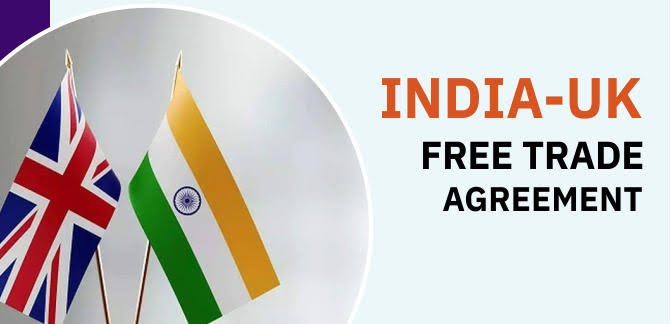India-UK Free Trade Agreement: In a major step towards strengthening economic cooperation, India and the United Kingdom have concluded negotiations on a Free Trade Agreement (FTA) aimed at doubling bilateral trade from the current $60 billion to $120 billion by 2030. The agreement, which had been under negotiation since January 2022, covers a wide array of sectors and is expected to create new opportunities for businesses and workers in both countries.
Here’s a comprehensive look at what this deal means for India — especially in terms of trade, services, investments, and employment.
What is a India-UK Free Trade Agreement (FTA)?
An FTA is a pact between two or more countries to reduce or eliminate tariffs and other trade barriers on goods and services. The India-UK FTA is designed to improve market access, simplify regulations, and promote a balanced, rules-based trade framework between the two countries.
Key Benefits for Indian Industry
The FTA significantly boosts India’s export potential and provides comprehensive market access in key sectors. Notably:
- 99% of UK tariff lines will be eliminated for Indian goods.
- This covers nearly 100% of the trade value between the two countries.
- The agreement paves the way to increase bilateral trade significantly by lowering costs and expanding export opportunities.
Sectors That Will Gain Zero-Duty Access to the UK Market:
Indian exporters will benefit from zero import duties on a wide range of industrial products:
- Textiles and Clothing
- Leather and Footwear
- Gems and Jewellery
- Furniture
- Sports Goods
- Base Metals and Transport Components
- Chemicals, Wood, Paper
- Mechanical and Electrical Machinery
- Minerals
These sectors currently face duties ranging between 4% to 16% in the UK. The removal of these tariffs will increase price competitiveness for Indian exports in the UK market.
Safeguards for India’s Sensitive Sectors
India has protected key domestic sectors by excluding them from duty concessions. These include:
- Agricultural Products like dairy, cheese, apples, oats, and vegetable oils
- Sensitive Industrial Goods such as plastics, diamonds, silver, smartphones, optical fibers, and base stations
India has also ensured that for select goods like chemicals, ceramics, petroleum products, aircraft engines, and certain engineering equipment, the duties will be phased out gradually, giving Indian manufacturers time to adapt.
Duty Concessions to the UK: Balanced and Phased
1. Scotch Whisky and Gin
- Current import duty: 150%
- Reduced to 75% immediately, then to 40% by the 10th year
- Covers only 2.5% of India’s whisky market, with minimal impact on domestic players
2. UK Automobiles
- Current duty: 100%+
- Will be reduced to 10% over time, but under strict quotas
- Electric vehicles (EVs) will benefit from concessional duty rates for limited imports only
- No duty cuts beyond quota limits, especially in the EV and ICE vehicle segments
This approach ensures that India maintains a protective barrier for its domestic auto sector while allowing controlled competition.
Major Gains for India’s Services Sector
The UK has made substantial commitments to support India’s services exports — a sector where India holds strong capabilities.
Mobility and Entry Rights:
UK has assured temporary entry and stay for several categories:
- Business visitors
- Intra-corporate transferees
- Contractual service suppliers (CSS)
- Independent professionals
- Investors and dependents of transferees
Sectoral Commitments Include:
- 36 sub-sectors under CSS, including:
- Yoga instructors
- Classical musicians
- Chef de cuisine
- 16 sub-sectors under independent professionals, such as:
- IT and Computer Services
- R&D Services
No Economic Needs Test:
The UK will not impose numerical or labor market tests, making it easier for Indian professionals to gain short-term work visas.
This provision significantly helps India’s tech, creative, and consulting industries, which are already deeply engaged in the UK market.
Social Security Relief for Indian Workers
A Double Contributions Convention (DCC) agreement has also been signed between India and the UK.
Benefits:
- Indian workers in the UK (temporarily posted) and their employers will be exempted from UK’s social security contributions for up to 3 years.
- This results in savings of up to 20% of the salary.
- Over 60,000 Indian IT professionals are expected to benefit.
- Estimated total savings exceed ₹4,000 crore (approx. $500 million) for Indian companies and employees.
This is a game-changer for Indian businesses with international operations, especially in the IT and consulting sectors.
Government Procurement: Is India Opening Its Market to the UK?
As of now, India has not opened its government procurement market to UK companies under this FTA.
This means:
- UK firms cannot automatically bid for public sector contracts in India
- India retains the right to prefer domestic suppliers for infrastructure and public service projects
This decision aligns with India’s strategic goal to promote local manufacturing and self-reliance under the Make in India initiative.
Broader Strategic Implications
1. Strengthening Ties with the Global West
The FTA strengthens India’s strategic ties with one of the largest economies in Europe. It also aligns with India’s goals to:
- Diversify export markets beyond China and the U.S.
- Attract UK investments in technology, pharmaceuticals, green energy, and manufacturing
2. Boosting India’s Global Trade Footprint
This deal is part of a broader move to sign similar agreements with other developed countries, including the EU, Canada, and Australia, giving India greater leverage in global trade negotiations.

